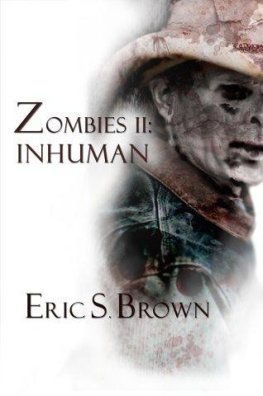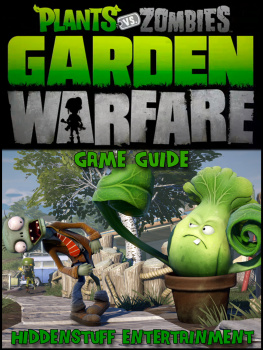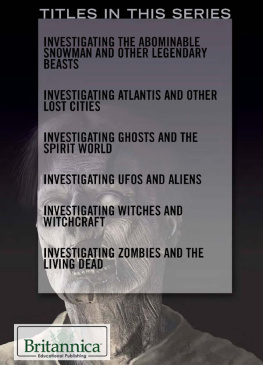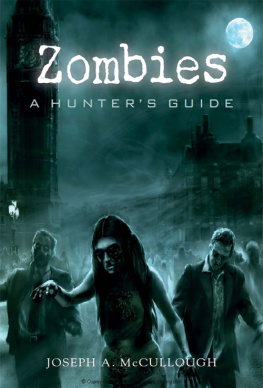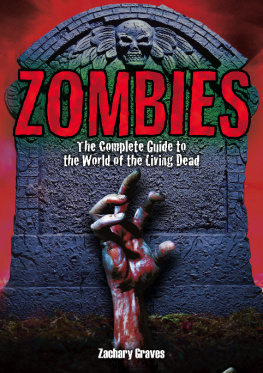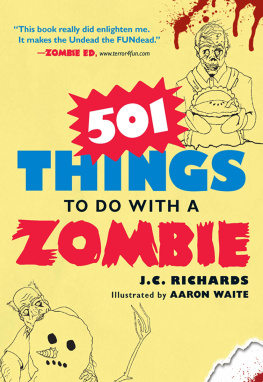All About Zombies
Marcus F. Griffin
Llewellyn Publications
Woodbury, Minnesota
Copyright Information
All About Zombies 2012 by Marcus F. Griffin
All rights reserved. No part of this book may be used or reproduced in any matter whatsoever, including Internet usage, without written permission from Llewellyn Publications, except in the form of brief quotations embodied in critical articles and reviews.
As the purchaser of this e-book, you are granted the non-exclusive, non-transferable right to access and read the text of this e-book on screen. The text may not be otherwise reproduced, transmitted, downloaded, or recorded on any other storage device in any form or by any means.
Any unauthorized usage of the text without express written permission of the publisher is a violation of the authors copyright and is illegal and punishable by law.
First e-book edition 2012
E-book ISBN: 9780738732817
Cover design by Adrienne Zimiga
Cover art: Zombie iStockphoto.com/Renee Keith
Grunge banner iStockphoto.com/mon5ter
E-book created by Steffani Sawyer
Edited by Becky Zins
Llewellyn Publications is an imprint of Llewellyn Worldwide Ltd.
Llewellyn Publications does not participate in, endorse, or have any authority or responsibility concerning private business arrangements between our authors and the public.
Any Internet references contained in this work are current at publication time, but the publisher cannot guarantee that a specific reference will continue or be maintained. Please refer to the publishers website for links to current author websites.
Llewellyn Publications
Llewellyn Worldwide Ltd.
2143 Wooddale Drive
Woodbury, MN 55125
www.llewellyn.com
Manufactured in the United States of America
Contents
Part 1: History
: The Funk of 40,000 Years
: The Donner Party: Americas First True Zombies?
: Dead Rising: Has Science Already Created Zombies?
: Pop Goes the Zombie: The Rise of Zombies in Popular Culture
Part 2: A Practical Guide
: Know Your Enemy: Types of Zombies You Might Encounter
: Surviving the First Few Days
: Tools of the Trade: Accessorizing Yourself for the Zombie Apocalypse
: Securing Safe Harbor in the Land of the Living Dead
Introduction
Zombies! These terrifying yet oft-misunderstood creatures have captured our hearts and stirred our imaginations (not to mention given us a few nightmares) for over fifty years. Ever since Night of the Living Dead, George Romeros original masterpiece, was released in 1968, zombies have continued to grow in popularityso much so, in fact, that many people believe the reality of a zombie apocalypse isnt a question of if but when. But would a zombie apocalypse be similar to what so often has been portrayed in film and works of horror fiction? Hordes of the risen dead wandering our streets, existing only to rend flesh from bone and devour our brains, as Hollywood and authors with a penchant for hyperbole would have us believe? Or would the reality of a zombie apocalypse be something entirely different? Is it possible that zombies would be enslaved by the human race and forced to do menial labor or even fight our wars? Would they be killed on sight or systematically herded into concentration camps for extermination?
Or perhaps zombies would be integrated into society as a new species of humanoid. After all, at one time zombies were just like you and I, werent they? At one time zombies were our friends and our families. They were our neighbors and our coworkers. They ran our governments, delivered our mail, and smiled at us from behind cash registers at Taco Bell and our local grocery stores. You see, with a zombie apocalypse comes the question of morality. Is Grandma still Grandma if she undergoes zombification and puts you on the Thanksgiving menu? Would sex with your spouse really be so different if he or she were a zombie?
As an educated society, these are the questions we should be asking ourselves long before Patient Zero has been hospitalized with an unknown illness and the world as we know it is plunged into madness and ruin. As an advanced civilization, we owe it to ourselves and to our zombie brethren to be prepared for any and all outcomes. And, of course, if it comes down to it, we should all be prepared to dispatch the zombie invaders quickly and efficiently. But if zombies be friends or foes, enemies or allies, to truly be prepared for their coming, we must learn all that we can about them beforehand. We must learn their origins and their history. We must understand their habits and their motivations. To truly understand our new zombie neighbors, we must adapt atypical mindsets, set aside dogmatic stereotypes, and develop a much broader point of view.
But when it comes to an all-out zombie invasion, history clearly has us at a disadvantage. We have very little factual information about them to be able to create even a basic framework to prepare ourselves for the eventuality of their arrival. But hidden away, deep within the annals of human history and the whimsy of pop culture, we may yet discover the keys to understanding them. From religious beliefs to graphic novels, movies, video games, and everything in between, our planets nations and their diverse cultures are filled to brimming with horrific tales of the dead rising from their graves and roaming the earth. So as much as we humans may differ from continent to continent, nation to nation, and town to town, it isnt difficult to see that where zombies are concerned, we all share a common belief. This is the belief that, in one form or another, zombies do exist.
So let us now set out in search of the origin and timeline of the zombie. Let us discover for ourselves what zombies really are and where they come from.
Part One: A History
Chapter 1
The Funk of 40,000 Years
I will knock down the gates of the netherworld. I will smash the doorposts and leave the doors flat down and will let the dead go up and eat the living! And the dead will outnumber the living.
The Epic of Gilgamesh
Did you ever wonder who the first zombies were and where they came from? So did I, so I sat my butt down in front of the computer and looked it up.
The etymology of the word zombie is uncertain, but it is most likely derived from the Creole word zombi . Zombi is the name of a snake deity worshipped in some cults of West African Vodun and Haitian Vodou (Voodoo). The word zombi is believed to have been derived from the Kongo word nzambi , which roughly translates to spirit of a dead person. Nzambi, the supreme god of the Bacongo people of Angola, is a deity who appears in different incarnations, one being Zombi-Damballah, or the Rainbow Serpent. You may recognize a variation of this deitys name in the title of the book The Serpent and the Rainbow , which was later made into a feature film. The Serpent and the Rainbow (subtitled A Harvard Scientists Astonishing Journey into the Secret Society of Haitian Voodoo Zombis and Magic ) was written by ethnobotanist and researcher Wade Davis and published by Stoddart Publishing in 1986. It is arguably the first serious published work about zombies that is based upon fact rather than fiction.
The Serpent and the Rainbow attempts to unravel the strange case of Clairvius Narcisse . Narcisse, a citizen of Haiti, was hospitalized in April 1962 with various symptoms, including fever, body aches, general malaise, and coughing up blood. After hospitalization, Narcisses condition rapidly deteriorated, and his doctors diagnosed him as suffering from digestive disorders, pulmonary edema, hypothermia, respiratory difficulties, and hypotension. Soon after these disorders and their symptoms manifested Narcisse died and was declared legally dead by two of his attending physicians, one of whom was an American and the other American trained. Narcisse was formally buried on May 3, 1962, the day after he had been declared legally dead. Yet in 1980, nearly eighteen years after his funeral, Narcisse was discovered by his sister Angelina wandering through the village where he had once lived. He had a strange and terrifying tale to tell about how he had been turned into a living zombie by a bokor (a sorcerer or voodoo priest, also called a houngan) and forced to work on a plantation for a number of years before a stroke of luck allowed him to escape his captors.
Next page


